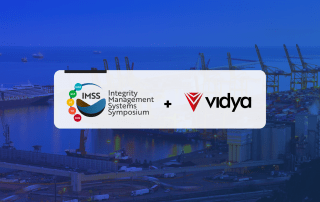Computer Vision 101: How can AI see things?
A world where computers can understand the environment around them simply by looking. This isn't science fiction anymore. It’s the new frontier of artificial intelligence called Computer Vision. It can perceive its surroundings and interpret visual information to identify objects, colors, shapes, and areas. This technology consists of a model that learns information from multidimensional data, such as images or videos, enabling machines to develop a visual perception like humans. Today, Computer Vision systems can analyze vast amounts of visual data with incredible accuracy. But how exactly was Computer Vision developed? How does it work? And what are the [...]
How to optimize Industrial Safety and Risk Management
The International Association of Oil and Gas Producers reported a 36% increase in offshore fatalities from 2020 to 2021. This concerning rise underscores the inherent safety challenges of the industry. Certainly, this sector is subjected to safety threats due to the complex processes and hazardous environments in which it operates. For this reason, high-complexity facilities such as oil and gas need to target safety and risk assessments as fundamental pieces of operational management. But what are the main concerns of the oil and gas industry regarding risk management? Concerns regarding risk management in the O&G Industry [...]
The 4 levels of Spatial Computing
Spatial Computing might be the next frontier of technological evolution. This technology blends virtual and physical environments for seamless interaction. Certainly, Apple's Vision Pro had a significant impact on the popularity of the concept among tech enthusiasts. Yet, it still represents a slightly abstract idea for most people, as it consists of a brand-new technology that presents different levels of immersion and integration within its scope. In this regard, it’s important to analyze the concept behind the different Spatial Computing levels. Virtual Continuum The concept surrounding Spatial Computing is defined as the Virtual Continuum. It represents [...]
How is AI applied to corrosion detection?
Corrosion detection is a challenging, risky, time-consuming, and expensive process. According to NACE, the global corrosion cost is estimated to be US$2.5 trillion, equivalent to 3.4% of the global GDP (2013). On top of that, it requires workers to inspect every edge of an enormous environment full of flammable hydrocarbons. However, the use of AI is reshaping this practice. In this context, AI-driven corrosion detection offers a safer and more sustainable method of addressing corrosion by providing a holistic perspective on Asset Integrity Management with 3D models, predictive algorithms, data contextualization, and Machine Learning. Thus, this blog analyzes how AI [...]
Vidya Goes Global: Launching Houston Headquarters
Curitiba - Houston, November 29th, 2023. Vidya Technology, a global technology provider committed to supporting the Mining and Oil and Gas industries, announces its first international office in the United States. The company’s new headquarters will be located in Houston. Founded in 2013, Vidya is a company that develops hardware, software, and artificial intelligence solutions for asset integrity and performance management. Our solutions have been trusted by major companies such as Ocyan, MODEC, Equinor, Petrobrás, Vale, and SLB. In 2024, Vidya plans to launch its first pilot project with a regional oil and gas company. ‘’The road ahead is filled [...]
Why traditional Corrosion Management methods are becoming obsolete
Offshore Oil operations are constantly threatened by an inevitable factor: Corrosion. Heavy corrosion damage can lead to extended unplanned shutdown times, decreased safety, and increased environmental exposure. This is why Oil and Gas companies struggle with traditional Corrosion Management methods becoming obsolete. However, corrosion management isn’t an easy task, involving locating, prioritizing, and treating corrosion signs along +300,000m² areas. Besides that, while operations need to execute interventions, they need to deal with limited maintenance time, budget constraints, and costly downtime. For this reason, the sector’s complexity requires an alternative method of addressing corrosion. The Importance of Corrosion Management [...]
Top 4 AI Trends of 2024
Intro As we step into the year 2024, Artificial Intelligence continues to transform industries and our daily lives. From chatbots to AI-automated processes, this technology is rapidly increasing the speed of operations while delivering more specified and data-driven decisions. In this volatile reality, trends and technological innovations emerge faster, reaching a point in which it is hard to keep track of new AI solutions. In this blogpost, we will explore some of the top AI trends to watch for in 2024, discussing how these trends are shaping the future of industries. 1. Increased Processing Capacity Over the [...]
Why AI is becoming a consolidated reality
Intro Artificial intelligence (AI) is a rapidly evolving field with the potential to transform many aspects of our lives. It is already having a significant impact on the job market, creating new jobs and transforming existing ones. Besides that, AI is democratizing innovation, helping people to be more productive and creative. This is leading to a wave of innovation from startups and individuals. However, in order to comprehend AI’s scope, it’s important to consider the fundamental aspects that led to AI’s meteoric rise. AI’s boom Throughout history, society always had the need for technological innovations. Although the [...]
Unlocking AI’s accuracy and reliability
AI's growth scenario From its early days as a theoretical concept to today's omnipresent reality, AI's journey has been characterized by exponential growth. According to a 2022 IBM research, more than a third of companies (35%) report the use of AI in their business, a four-point increase from 2021. This illustrates a key change in the way we face reality, but different from other technological revolutions: today’s tool learns from its own experience at increasingly higher speed and scale. These tools are programmed to have a human-like thought process. Moreover, they are now a reality in the [...]
Vidya will be in the next IMSS
The Integrity Management Systems Symposium (IMSS) is taking place between August 2nd and 4th in Rio de Janeiro, Brazil, and Vidya will be there! The main objective of IMSS is to foster discussions in the oil and gas industry regarding the "New SGSO", which stands for Operational Safety Management in Portuguese, it is Brazil's first operational safety regulation, which is composed of 17 different performance-oriented and risk management practices for improving facilities and operations in the oil and gas industry. The discussions will contemplate the Management Systems belonging to this new regulatory framework (a package of laws that aims to [...]










